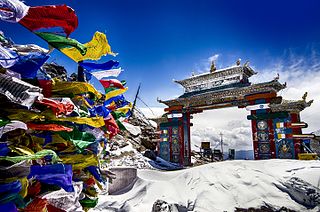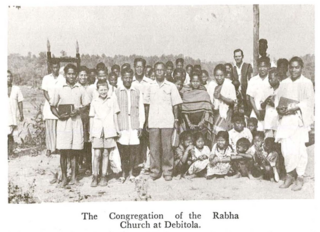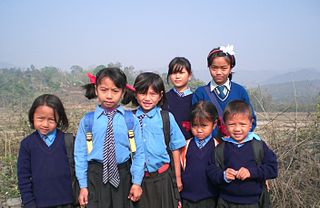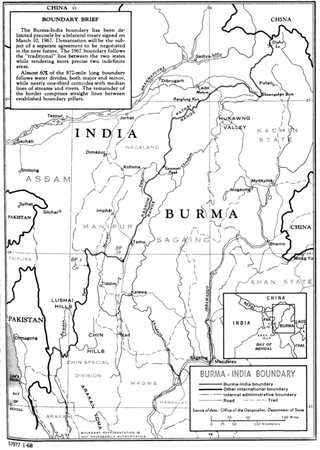Related Research Articles

Northeast India, officially the North Eastern Region (NER), is the easternmost region of India representing both a geographic and political administrative division of the country. It comprises eight states—Arunachal Pradesh, Assam, Manipur, Meghalaya, Mizoram, Nagaland and Tripura, and the "brother" state of Sikkim.

The Insurgency in Northeast India involves multiple separatist and jihadist militant groups operating in some of India's northeastern states, which are connected to the rest of India by the Siliguri Corridor, a strip of land as narrow as 14.29 miles (23.00 km) wide.

Rabha Baptist Convention (RBC), previously known as “Rabha Baptist Church Union”, is a Baptist Christian denomination in India. It is in the East of India, primarily in the state of Assam. The Union is made up primarily of Rabha people, an indigenous ethnic group of northeastern India.

All Assam Students' Union or AASU is an Assamese nationalist student's organization in Assam, India. It is best known for leading the six-year Assam Movement against Bengalis of both Indian and Bangladeshi origin living in Assam. The original leadership of the organisation, after the historic Assam Accord of 1985, became part of the newly formed Asom Gana Parishad which formed a state government in Assam.

Bhishma Narain Singh was an Indian politician who served as the Governor of Assam from 15 April 1984 to 10 May 1989 and was the Governor of Tamil Nadu between 15 February 1991 and 30 May 1993. He belongs to the Surwar (gour) royal family of Namudag Raj, Jharkhand.
Naga nationalism is an ideology that supports the self-determination of the Naga people in India and Myanmar, and the furtherance of Naga culture.
Takam Sanjoy is an Indian politician and Member of Parliament belonging to the Indian National Congress. In the 2009 general election he was elected to the 15th Lok Sabha, the lower house of the Parliament of India from the Arunachal West constituency of Arunachal Pradesh.

Mamang Dai is an Indian poet, novelist and journalist based in Itanagar, Arunachal Pradesh. She received Sahitya Akademi Award in 2017 for her novel The Black Hill.
The Council of Baptist Churches in Northeast India is a Baptist Christian denomination in North East India. It is a member of the Asia Pacific Baptist Federation. It is also a member body of the North East India Christian Council, the regional council of the National Council of Churches in India. Its presently led by Rev. SR Onesimua Anal as President and Rev. Prof. Akheto Sema as General Secretary.
The North-East Democratic Alliance is a political coalition that was formed on 24 May 2016, by Bharatiya Janata Party. The motive of the new political front was to unite non-Congress parties in Northeast India. Himanta Biswa Sarma was appointed as the convenor of the front.
The Citizenship (Amendment) Act, 2019 (CAA) was passed by the Parliament of India on 11 December 2019. It amended the Citizenship Act, 1955 by providing an accelerated pathway to Indian citizenship for persecuted religious minorities from Afghanistan, Bangladesh and Pakistan who arrived in India by 2014. The eligible minorities were stated as Hindus, Sikhs, Buddhists, Jains, Parsis or Christians. The law does not grant such eligibility to Muslims from these countries. Additionally, the act excludes 58,000 Sri Lankan Tamil refugees, who have lived in India since the 1980s. The act was the first time that religion had been overtly used as a criterion for citizenship under Indian law, and it attracted global criticism.

The hill tribes of Northeast India are hill people, mostly classified as Scheduled Tribes (STs), who live in the Northeast India region. This region has the largest proportion of scheduled tribes in the country.

The Citizenship Amendment Act (Bill) protests, also known as the CAA Protest, CAB Protest or CAA and NRC protests, occurred after the Citizenship Amendment Act (CAA) was enacted by the Government of India on 12 December 2019. The move sparked a widespread national and overseas ongoing protests against the act and its associated proposals of the National Register of Citizens (NRC). The protests first began in Assam and spread swiftly in other states such as Delhi, Meghalaya, Arunachal Pradesh, and Tripura on 4 December 2019. Protests broke out rapidly across the country, although the concerns of the protesters vary.

The India–Myanmar border is the international border between India and Myanmar. The border is 1,643 kilometres (1,021 mi) in length and runs from the tripoint with China in the north to the tripoint with Bangladesh in the south.

The Naga Students' Federation is the largest representative body for students of the Naga people. It was established on 29 October 1947.

Dipankar Borah is an Indian field botanist from Assam.
Anti-Bengali sentiment comprises negative attitudes and views on Bengalis. This sentiment is present in several parts of India: Gujarat, Bihar, Assam, and various tribal areas. etc. Issues include discrimination in inhabitation, other forms of discrimination, political reasons, government actions, anti-Bangladeshi sentiment, etc. The discriminative condition of Bengalis can be traced from Khoirabari massacre, Nellie massacre, Silapathar massacre, North Kamrup massacre, Goreswar massacre, Bongal Kheda, etc. This has led to emergence of Bengali sub-nationalism in India as a form of protest and formation of many pro-Bengali organisations in India.

Beginning in May 2022, deadly floods hit northeastern India and Bangladesh. Over 9 million people in both countries have been affected, and around 300 people were killed.

Since India's 1947 independence, 98% of Northeast India's borders have been with other Asian countries, making it a strategic frontier region. The East Asian countries of Japan and Korea have significant contemporary influence over and cultural similarities with Northeast India; Northeast India engages to a significant extent with Korean and Japanese culture and has been receiving infrastructural investment from Japan. Northeast India also has substantial historical connections to Southeast Asia; India's Act East policy seeks to harness this connectivity in the modern day.
The WeSean Student Federation (WSF) is a student organization representing students from the Northeastern India and parts of Myanmar (Chin, Kachin and Naga areas of Sagaing).
References
- ↑ TIMES, MOKOKCHUNG (2022-11-26). "Mutsikhoyo Yhobu elected Secretary General of NESO » MokokchungTimes.com". mokokchungtimes.com. Retrieved 2025-01-13.
- ↑ Meghalaya, Syllad | The Rising (2022-11-26). "Samuel Jyrwa re-elected as NESO chairman; NESO says North East should be treated as a special economic zone". Syllad. Retrieved 2025-01-13.
- ↑ "North East Students' Organisation requests HM Shah to ensure no Bangladeshi enters N-E states illegally". ddnews.gov.in. Retrieved 2025-01-13.
- ↑ "Northeast students' body urges PM Narendra Modi to break his silence, visit restive Manipur". The Times of India. 2024-09-13. ISSN 0971-8257 . Retrieved 2025-01-13.
- ↑ "North East students' body stages demonstrations to register protest against CAA". India Today. 2021-12-11. Retrieved 2025-01-13.
- ↑ Mazumdar, Prasanta (2014-10-17). "NESO Seeks Inclusion of Northeast History in School Syllabi". The New Indian Express. Retrieved 2025-01-13.
- ↑ "NE Students' Organization (NESO) To Sponsor 16 Aspirants From Indigenous Communities Annually". Northeast Live. 2024-12-16. Retrieved 2025-01-13.
- ↑ Tribune, The Assam (2024-11-11). "Court grants bail to MSU President in ACB case; denies bail in kidnapping charges". assamtribune.com. Retrieved 2025-01-13.
- ↑ Sangno, Amar (2022-05-23). "Is AAPSU a waning pan-Arunachal entity? | The Arunachal Times" . Retrieved 2025-01-13.
- ↑ "Plagued by corruption, BJP destroying students' future, says Congress leader". The Hindu. 2022-02-09. ISSN 0971-751X . Retrieved 2025-01-13.
- ↑ Rihard Fick (1920). The Social Organisation In North East India.
- ↑ Singh, Vijaita (2024-02-08). "India suspends Free Movement Regime with Myanmar". The Hindu. ISSN 0971-751X . Retrieved 2025-01-13.
- ↑ "Free Movement Regime". Drishti IAS. Retrieved 2025-01-13.
- ↑ "WSF seeks UN's intervention over 'unjust' CAA legislation". MorungExpress. Retrieved 2025-01-13.
- ↑ Bijukumar, V. (2022-01-01). "Ethnicity and Political Action in North-East India: Agency, Mobilisation and Community Relationship". History and Sociology of South Asia. 16 (1): 7–26. doi:10.1177/22308075221083710. ISSN 2230-8075.